Wednesday, August 12, 2009
Let The Debate Begin: Which Championship Is The Penguins' Greatest? Installment I
As promised, it's time to begin the debate on which of the Pittsburgh Penguins' three Stanley Cup Championships is the greatest.
Some will view all 3 titles as equally great. Others will not. Certainly, each run was different for the Penguins, with different players, different moments, and different degrees of difficulty. And that's what makes this analysis admittedly subjective. Each person is going to examine the question in a way another person will not.
Personally, I believe one title stands above the others, and once I have reviewed all 3 Cup runs separately -- which I will do over the next several weeks -- I'll reveal which championship I believe is the Penguins' best and indicate why.
In the meantime, I have posted a poll to the right which gives you a chance to vote on which title you think was the greatest. I'll leave the poll posted for a while, so please weigh in and let me know what you think. Do it now, or wait until I have posted on all 3 championships and then decide.
So, without further adieu, let's review the Pittsburgh Penguins' 1990/1991 Stanley Cup Championship run and team:
The 1990/1991 season was the first and only full season Bob Johnson coached the Penguins before being diagnosed with -- and succuming to -- brain cancer early the following season.
While losing Johnson was a tragic blow for the franchise, all it took "The Badger" was a single year to leave an indelible impact on the Pittsburgh Penguins for decades to come, as evidenced by the franchise's first Stanley Cup Championship at the end of that season, and by the fact that, even today, the Penguins' rely on Johnson's famous "It's a Great Day For Hockey" phrase in promotions with the current group of flightless birds.
The Penguins were generally regarded as on the rise throughout hockey circles beginning in the late 1980's when Mario Lemieux led them back to the post-season for the first time since he was drafted in 1984. That was in the 1988/89 season and, while the Penguins missed the post-season the following year, they bounced back in the '90/'91 season after the trade deadline splash that landed them my favorite player of all time -- Ron Francis -- and Ulf Samuelsson and returned the post-season on the heels of the team's first Patrick Division championship.
In round 1, the Penguins faced off against a Patrick nemesis, the New Jersey Devils, and they didn't have an easy time of it. After battling the Devils even in the first four games, the Penguins lost game 5 at home and faced elimination on the road in game 6. Worse, starting star goaltender Tom Barrasso came up with back spasms at that point in the series and had to give the crease over to backup netminder Frank Pietrangelo.
What did Pietrangelo do? Only make one of the greatest stops in NHL history in game 6, robbing New Jersey star Petr Stastny with a reachback glove effort that is known in Pittsburgh only as "The Save". For those who can't ever get enough of watching that save, click here:
http://www.youtube.com/watch?v=wAh5PTg_Qr4
That save virtually took the steam right out of New Jersey. The Penguins won that game 4-3, then returned home and finished off the Devils with a 4-0 shutout -- again with Pietrangelo in goal -- to send New Jersey packing and set up a 2nd round set against the Washington Capitals.
Unlike many of the Penguins' series against the Caps' in ensuing years, this one was not a 7-gamer, nor one where the Penguins had to come back from a 2-0 or 3-1 series deficit. After dropping the first game of the Patrick finals to Washington that year, the Penguins won in overtime in game 2 when Kevin Stevens finished off a 2-on-1 by taking a Francis pass and beating Caps' netminder Mike Liut. Again, highlights anyone?? :
http://www.youtube.com/watch?v=Bgcsy9zyeYE
Watching that clip was a great reminder of how Caps' defenseman Al Iafrate was no Paul Coffey. Iafrate basically tried to mimick what Pens' D-man Coffey did just seconds before and rush the puck all the way up the ice. Fortunately for Pittsburgh, Iafrate turned over the puck and that led to the 2-on-1 that Stevens finished.
Washington never recovered after that. They dropped the next 2 games at home and the Penguins finished them off in game 5 back at Mellon to set up a Conference Final against the Boston Bruins.
It's hard to forget the Bruins' series, because the Penguins dropped the first two games on the road -- including game 2 on an overtime goal by Bruins' forward Vladimir Ruczicka -- and were staring hard at a quick elimination at Boston's hands.
In the locker room after game 2, Stevens boldly and unambiguously declared that the Penguins would come back and win the series. Stevens' Penguin teammates obviously rallied around that cry because they then won the next 4 games and rolled the Bruins right out of the postseason in dominating fashion in the process, outscoring Boston in those games 20-7.
The Penguins' series win against the Bruins' propelled them to their first Stanley Cup Final, against the Campbell Conference Champion Minnesota North Stars.
While I don't think many NHL observers at the time necessarily expected a Pittsburgh/Minnesota final, the teams played a fairly good series -- especially for the first 4 games. And it's hard to say what was more notable about the series looking back.
Obviously, the Penguins' first Stanley Cup championship stands out high on the list of franchise moments, but there probably isn't a hockey fan alive that hasn't seen or doesn't know about Mario Lemieux's heart-stopping goal in game 2, where he went 1-on-2 on a rush into the Minnesota zone, split North Stars' defenseman Mark Tinordi and Shawn Chambers -- leaving Chambers in a heap on the ice in his wake -- before deking Minnesota netminder Jon Casey out of his pants and deposing a backhand into the vacated cage all while falling down to the ice.
Watch this for a deserving encore:
http://www.youtube.com/watch?v=pEdgiPEDa8w
Despite that effort by Lemieux in game 2, the North Stars took a 2-1 series lead after winning game 3 and, going into game 4 in their building, talk started to surface that Minnesota was planning their Cup parade.
When word about that got out, the North Stars didn't win another game.
In games 4, 5 and 6, the Penguins opened up the offense and put 19 goals behind a beleaguered Casey, blitzkrieging the North Stars defense for multiple quick-strike goals in each of those games, culminating in a 8-0 whitewashing of Minnesota in the Cup-clinching game 6 where even the likes of defenseman Jim Paek and Ulf Samuelsson got into the goal-scoring act.
Lemieux was a deserving Conn Smythe winner that season, too. It was his first crack at Lord Stanley and everyone knows that he wasn't going to let it slip away after getting that close.
I'll never forget the Penguins winning that Cup -- their first.
I was 18 at the time and had been a fan for only 8 years up to that point, dating back to 1983, but I took to hockey quickly and greatly, and was very passionate about it. It was such a great moment for me as a fan.
I should have gone out to the airport to greet them as they came back to town, but my girlfriend at the time was busy with me that night, so ..... While that wasn't a bad alternative, in hindight, I should have partied with all the other fans at Pittsburgh International instead.
ANYWAY ....
The Penguins really blossomed in the 1990/1991 season as an offensive force. They had Lemieux, Francis and Stevens leading the way offensively, and had capable then-support players in Mark Recchi and Joe Mullen. Of course, Coffey and Larry Murphy patrolled the backline and Barrasso tended goal.
In addition, that Penguins team had grit and sandpaper to match their skill. Troy Loney, Bob Errey, Phil Bourque filled those roles up front and Samuelsson paced the backline in that department.
In short, the Penguins were well-balanced. As I said, they came into their own that year, and that obviously continued into the next season.
Looking at the entire run, the Penguins faced several key doses of adversity (game 6 against the Devils; going down 2-0 against Boston), won a 7-game series, had the all-important short series in round 2, and just took things over when it mattered most in the final. They didn't have to go through the toughest of competition record-wise or rankings-wise (save for their underdog, comeback victory over the Bruins in the Conference Finals, which may have been their most impressive accomplishment during the run), but give them credit for taking advantage of that. That's what good teams do.
Next time, I'll review the Penguins' 2nd Stanley Cup championship team and playoff run -- the one from 1991/1992 that capped back-to-back titles for the birds.
Subscribe to:
Post Comments (Atom)






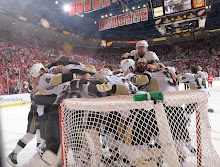
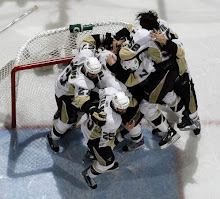

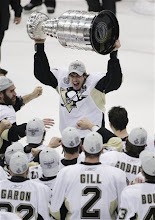
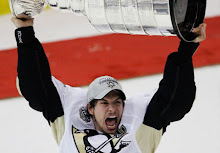
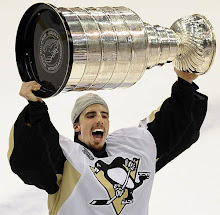
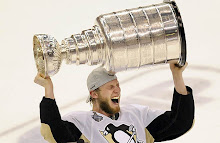
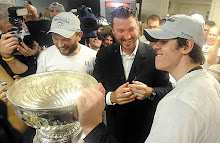
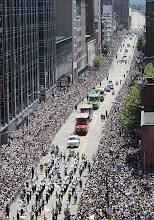



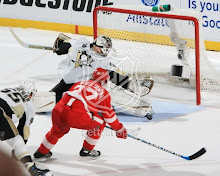
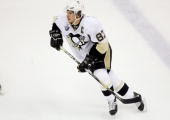
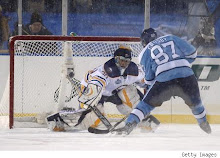
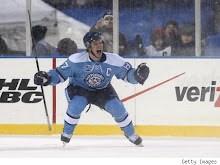
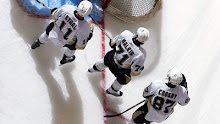

No comments:
Post a Comment